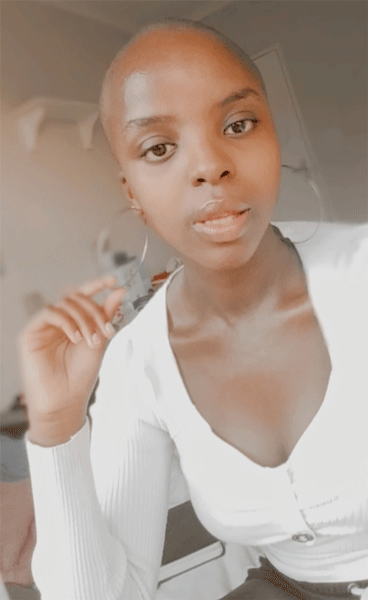
By Grant Moyo
Spoken word poet Tafadzwa Mavindidze has implored men to make the constructive mindset changes that are necessary to help break domestic abuse and gender-based violence.
She said the ongoing social ills are immensely violating the fundamental formal rights and their translation into tangible gains for girls and women. The vocal poet, who is a penultimate year law student at Rhodes University in South Africa, emphasised the need to stem the surge in the normalisation of violence and gender discriminatory norms which in most instances lead to femicide (killing of women) more often than not committed by men.
Ensuring that her poems speak up for social justice, Mavindidze continues to lead from the front posting videos on Instagram in efforts to address various dispiriting impediments and afflictions humiliating women, and the stigma associated with mental illness in Africa.
“One of the biggest issues right now in the world is gender-based violence, a menace to the vulnerable influencing femicide,” Mavindidze said.
“As a female studying in South Africa where there’s a high rate of killing, abduction, as well as sexual and physical abuse of girls and women, I’m constantly confronted with the scary reality that I’m not safe and society will not look out for me.
“I hope through my poems people can finally open their eyes and ears to the truth about it. I want to see a culture of acceptance and kindness among people because we’re all going through things that are affecting us differently.
“Gender-based violence is a systematic issue, it goes to the root of the way we’re raised and the things that society normalises. As activists, we can make noise about it, but it’s important to bear in mind that it’s a lot bigger than just sexual abuse and harassment. It goes into patriarchy and entitlement, with society creating a list of what a woman should be, but letting men be anything.
- Chamisa under fire over US$120K donation
- Mavhunga puts DeMbare into Chibuku quarterfinals
- Pension funds bet on Cabora Bassa oilfields
- Councils defy govt fire tender directive
Keep Reading
“Micro-aggression builds up into the bigger problems that we’re fighting now. We cannot tackle these issues at the top level after deaths have occurred. We need to deal with the problems at the root level first because they exist in our households, communities, and in the media content that we consume every day.”
In an effort to dismantle the systematic issues that have been enabling perpetrators to freely inflict brutality without being held accountable, Mavindidze confronts abusers in a poem titled The Man I Love, which she recited in a video she posted on Instagram in June. She noted that when she wrote the poem she was aware that publicly advocating for the social well-being of girls and women would help in safeguarding them from femicide. The poem created dialogues among her followers who got involved posting comments, sending messages to her inbox, as well as liking and viewing the video numerous times.
“The poem addresses the fact that rapists do not live in a vacuum and are members of our society who can sometimes take the form of the ones we love,” she said.
“People are quick to be activists when the perpetrators are unknown but refuse to hold their loved ones accountable. A lot of activism is performative, with no real care for the girls and women within our society and what they have gone through.
“People would rather believe a perpetrator than stand with girls and women who have suffered abuse. The Man I Love is a wake-up call and a jab at the hypocrisy of society.
“I couldn’t be silent, it was necessary to say something, I needed to proactively add my voice to the movement, not just for me but for all girls and women.
“As an outspoken young woman, I felt I needed to create meaningful content, so when I posted the video I hoped it would be relevant. I want to see a world where girls and women don’t walk around in fear, hence I thought of starting these conversations.”
Mavindidze acknowledged that such sombre experiences are traumatic, if they do not result in manslaughter they normally lead to mental strain which has loads of stigma in the African environment. She proclaimed that if being African means mental illness is ignored, the future of the continent is barren.
The 21-year-old avid writer with a love for spoken word poetry admitted that the trauma befalling victims of abuse does not just exist culturally, as in institutions like universities where perpetrators get away with atrocity, victims have to relive their pain every day which threatens their mental health.
“My other video on my Instagram pages called Dear Soldier is a motivational piece addressing mental illness, the message being put across is that, ‘it’s okay not to be okay’. There’s stigma which dictates that mental instability is a weakness. This might not be further from the truth, it’s human to grieve and feel pain,” she said.
“As emotional human beings living and experiencing life, we cannot expect that some of the terrible things that happen will bounce off us easily. But the shinga mwanangu [be strong] narrative robs us of the opportunity to deal with our pain, trauma and grief. This takes a toll on girls and women mentally, leading to depression and in many sad instances suicide.”
Born in Harare, Mavindidze has always been a bookworm and that is where her love for poetry developed. Poetry recitals for the National Allied Arts competition in primary school introduced her to performing arts and she started writing short novels as well as poems in high school.
The vocal poet intends to perform on relevant platforms in front of policymakers if the Covid-19 global shock is contained. Hopefully, she influences the implementation of laws and policies that permanently thwart indecency, significantly protecting girls and women.











